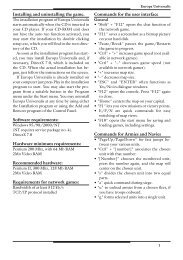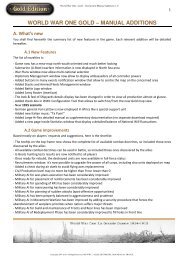You also want an ePaper? Increase the reach of your titles
YUMPU automatically turns print PDFs into web optimized ePapers that Google loves.
Coordination between Allies<br />
Entente Armies of different nationality have a -2 penalty to the Coordination<br />
D12. This does not apply on the Western Front (French and Italian sectors)<br />
as soon as the InterAllied GHQ is created, or if Nivelle is at the GHQ.<br />
French Generals<br />
● Joffre (GHQ): Individual rail section capacity in France increases to 6<br />
(instead of 5)<br />
● Gallieni: Removed at the end of Nov-December 1914, he is replaced<br />
by Maunoury<br />
● Petain: In the event of a mutiny, he benefits from several<br />
advantages.<br />
● Nivelle: Gives a +1 bonus to the Rolling Barrage tactic, to 1 sub-battle<br />
only if he leads the HQ, or to 2 sub-battles if he is in the GHQ. When<br />
he is appointed to the GHQ, the French and the British may<br />
coordinate without penalty. The French and the British may send each<br />
other reinforcements, without carrying out a Reaction test. On the<br />
other hand, any Anglo-French Great Offensive is commanded by<br />
Nivelle (thus by France), even if Britain engages more corps than<br />
France<br />
Alps Garrison<br />
The 5-6-4 [mountain] and the 3-4-3 can be moved freely, if Italy’s level<br />
changes to 0 (or lower), no matter whether or not it rises later.<br />
French Railroads<br />
Beginning in 1917, the rail capacity lowers by 1.<br />
France:<br />
1914-1916 (14)<br />
1917 (13)<br />
1918+ (12).<br />
Joffre at the GHQ increases the transport capacity per rail to 6 units for<br />
French sections (instead of 5).<br />
Sea Transport Capacity<br />
France has a naval transport capacity of 6 units per turn, or 3 units (half)<br />
to attempt a landing.<br />
The “Orient” VIII Army<br />
Only the “Orient” VIII Army may be sent away from the French or Italian<br />
front (if Italy is hostile), or be used to attempt a landing.<br />
First, it is necessary for the Political Action “Expeditionary Corps” to be<br />
successful.<br />
The Orient Army has the power to be able to integrate foreign corps under<br />
its command, without distinction.<br />
If a foreign corps is placed “out of combat”, it may return directly to the<br />
Orient Army during the next turn (this is an exception).<br />
During the Reinforcement Phase, the Orient Army may only bring 2 corps<br />
back to full strength, no matter what their nationality may be.<br />
152 World War One: La Grande Guerre 1914-1918<br />
If the Orient Army is sent into the Balkans, and the Serbian Army is no<br />
longer in play for Entente, the Orient Army acquires a capacity of 12 corps<br />
in this particular instance (this is an exception).<br />
The Blue Line of the Vosges<br />
France is looking towards Alsace-Lorraine and, more generally, towards<br />
the entire French front. Victory must be born there.<br />
All French corps, leaving the Western Front to rejoin the Orient Army* far<br />
away, makes France lose NW -1<br />
*or any other Allied Army.<br />
This does not concern the 3 corps belonging to the Orient Army (with<br />
#VIII), nor the support units (artillery, tanks, etc).<br />
This rule is canceled as soon as the InterAllied GHQ is in place or if<br />
Clemenceau attains power or if Option (Gallieni) has been chosen.<br />
French Garrisons<br />
Garrison corps in fortresses may be “liberated” to be integrated into French<br />
Armies, by playing Political Action XXX.<br />
Clemenceau<br />
Clemenceau, nicknamed “the tiger”, may be named President of the<br />
Counsel by the French, beginning in 1917, by playing the “Clemenceau”<br />
event. It offers the following advantages:<br />
● France obtains a bonus of +1 to all its Social Tests (Strike, etc…).<br />
● The French Parliament moves 2 boxes towards Union Sacree (to the<br />
right).<br />
● France has a -2 bonus for the Parliament Test (instead of -1).<br />
● France has a +1 for the Patriotic Test and -1 for the War Weariness<br />
Test.<br />
● Clemenceau stays in power until the end of the war, except in the<br />
following cases a Political Test takes place (D12):<br />
- Paris, Verdun, Strasbourg**, Metz** have just been taken by<br />
Central Powers (**if they were conquered)<br />
- or if Parliament has shifted to the left (no matter what the cause)
















